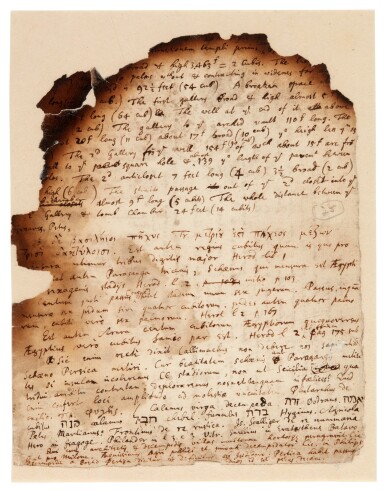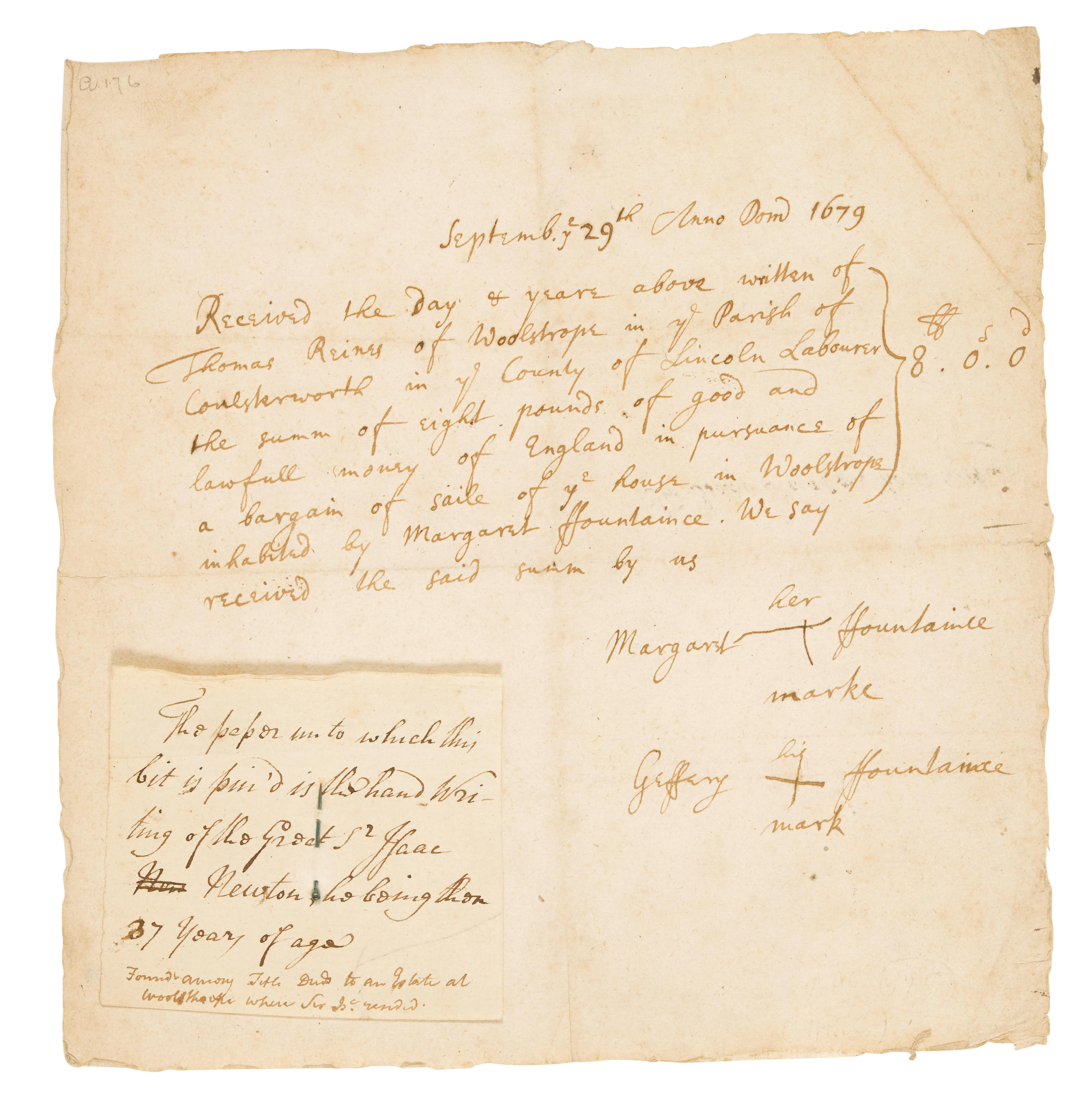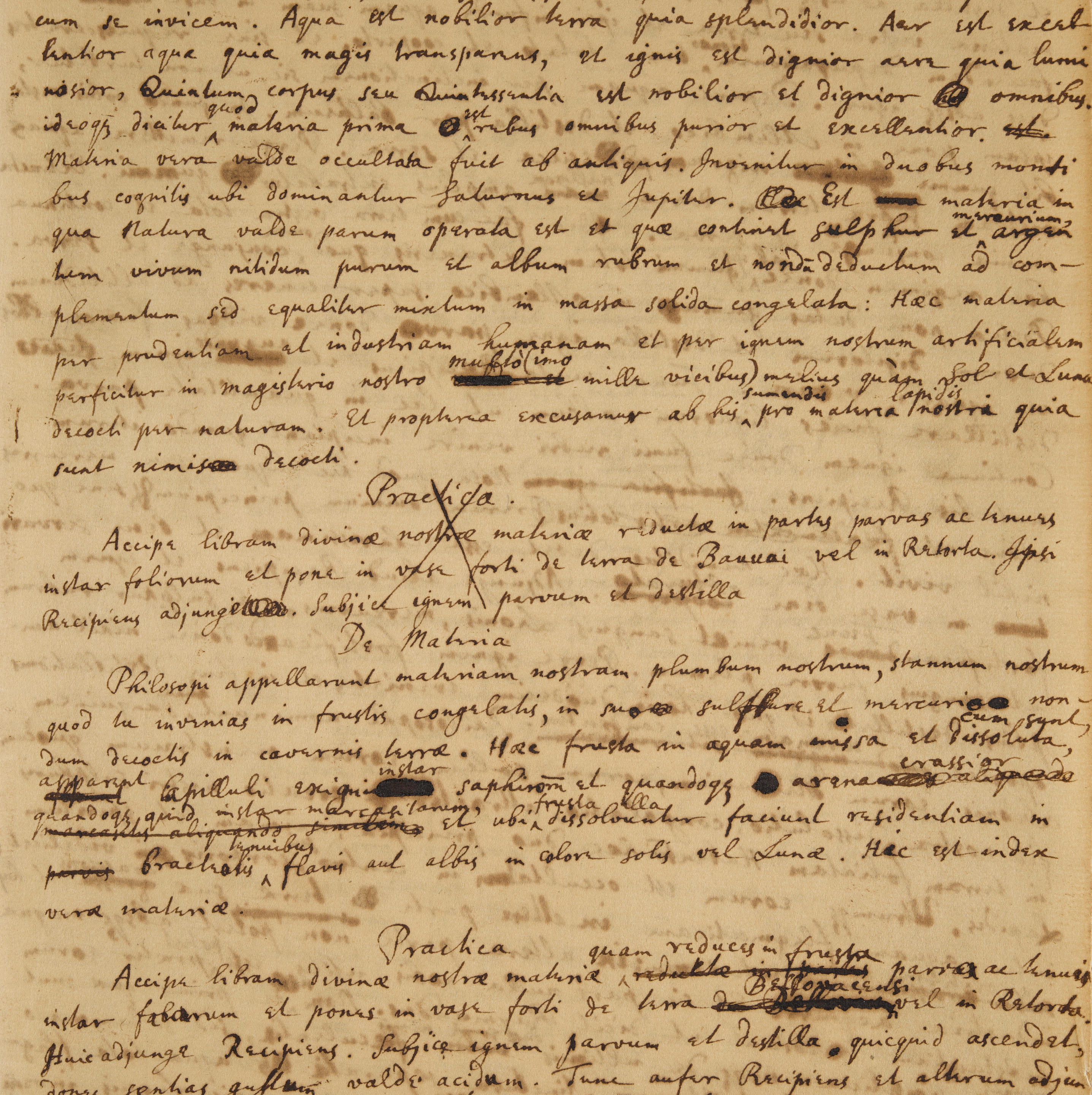NEWTON, Isaac (1642-1727). Autograph manuscript, a draft for a theological tract on Christian doctrine focusing on the Old Testament, n.d. [1710s-1720s]. In English, 1 1/3 pages, 303 x 185mm, approx. 71 lines (c.978 words), autograph emendations and cancellations, three passages (numbered '2', '1', '3') Provenance : Isaac Newton – Catherine Barton (1679–1739), his half-niece – her daughter, Catherine (b.1721), married John, 1st Viscount Lymington – Earls of Portsmouth, sold as part of the Portsmouth Papers (Sotheby's, 13/14 July 1936, lot 255) to Emmanuel Fabius, Parisian bookseller. The present manuscript is SL255.6 in the Portsmouth Papers, the archive of Newton's writings whose sale in 1936 finally revealed the depth of his interest in theology – as well as his own unorthodox beliefs – and alchemy. Newton sets out his approach to Biblical hermeneutics, writing on the central importance of the Old Testament – rather than metaphysics or philosophy – for understanding the nature of Christ. '2 The Faith w[hi]ch Christ taught his disciples after his resurrection, & which he sent them to teach all nations in disciplining them, he taught out of Moses & the Prophets & Psalms, opening their understanding that they might understand what was writ concerning him’. Newton then treats the various names for Christ in turn, explaining their meaning with reference to the Old Testament. ‘So then for understanding these names of Christ, we are to have recourse unto the old Testament & to beware of vain Philosophy. For Christ sent his Apostles, not to teach Metaphysicks & Philosophy’. The following passage explores the responsibility borne by each part of the Trinity in the creation and redemption of the world, for which they should be worshipped: 'And all this worship is included in the first principles of the doctrine of Christ & is sufficient for salvation. And if any man hath a mind to add to this worship he may do it in his closet without troubling the Churche with his private sentiments'. Finally, Newton returns to two further names for Christ from the Old Testament, one of which derives from Daniel's vision of the Ram and the He-Goat, from whence comes the idea of the Antichrist: 'But these difficulter points are to be recconed amongst the strong meats for men of riper years rather than among the first principles of the doctrine of Christ'. Newton argues against infusing metaphysical and philosophical meaning into the Biblical names of Christ: the same scepticism towards a metaphysical understanding of the Bible that informed his well-known anti-Trinitarian beliefs. Newton deemed his theological investigations 'a duty of the greatest moment', and the clarification of Christ’s true nature was a subject to which he gave repeated and special attention, his studies ultimately embracing the entire vast corpus of patristic literature.
NEWTON, Isaac (1642-1727). Autograph manuscript, a draft for a theological tract on Christian doctrine focusing on the Old Testament, n.d. [1710s-1720s]. In English, 1 1/3 pages, 303 x 185mm, approx. 71 lines (c.978 words), autograph emendations and cancellations, three passages (numbered '2', '1', '3') Provenance : Isaac Newton – Catherine Barton (1679–1739), his half-niece – her daughter, Catherine (b.1721), married John, 1st Viscount Lymington – Earls of Portsmouth, sold as part of the Portsmouth Papers (Sotheby's, 13/14 July 1936, lot 255) to Emmanuel Fabius, Parisian bookseller. The present manuscript is SL255.6 in the Portsmouth Papers, the archive of Newton's writings whose sale in 1936 finally revealed the depth of his interest in theology – as well as his own unorthodox beliefs – and alchemy. Newton sets out his approach to Biblical hermeneutics, writing on the central importance of the Old Testament – rather than metaphysics or philosophy – for understanding the nature of Christ. '2 The Faith w[hi]ch Christ taught his disciples after his resurrection, & which he sent them to teach all nations in disciplining them, he taught out of Moses & the Prophets & Psalms, opening their understanding that they might understand what was writ concerning him’. Newton then treats the various names for Christ in turn, explaining their meaning with reference to the Old Testament. ‘So then for understanding these names of Christ, we are to have recourse unto the old Testament & to beware of vain Philosophy. For Christ sent his Apostles, not to teach Metaphysicks & Philosophy’. The following passage explores the responsibility borne by each part of the Trinity in the creation and redemption of the world, for which they should be worshipped: 'And all this worship is included in the first principles of the doctrine of Christ & is sufficient for salvation. And if any man hath a mind to add to this worship he may do it in his closet without troubling the Churche with his private sentiments'. Finally, Newton returns to two further names for Christ from the Old Testament, one of which derives from Daniel's vision of the Ram and the He-Goat, from whence comes the idea of the Antichrist: 'But these difficulter points are to be recconed amongst the strong meats for men of riper years rather than among the first principles of the doctrine of Christ'. Newton argues against infusing metaphysical and philosophical meaning into the Biblical names of Christ: the same scepticism towards a metaphysical understanding of the Bible that informed his well-known anti-Trinitarian beliefs. Newton deemed his theological investigations 'a duty of the greatest moment', and the clarification of Christ’s true nature was a subject to which he gave repeated and special attention, his studies ultimately embracing the entire vast corpus of patristic literature.







.jpg)
.jpg)



.jpg)


Testen Sie LotSearch und seine Premium-Features 7 Tage - ohne Kosten!
Lassen Sie sich automatisch über neue Objekte in kommenden Auktionen benachrichtigen.
Suchauftrag anlegen